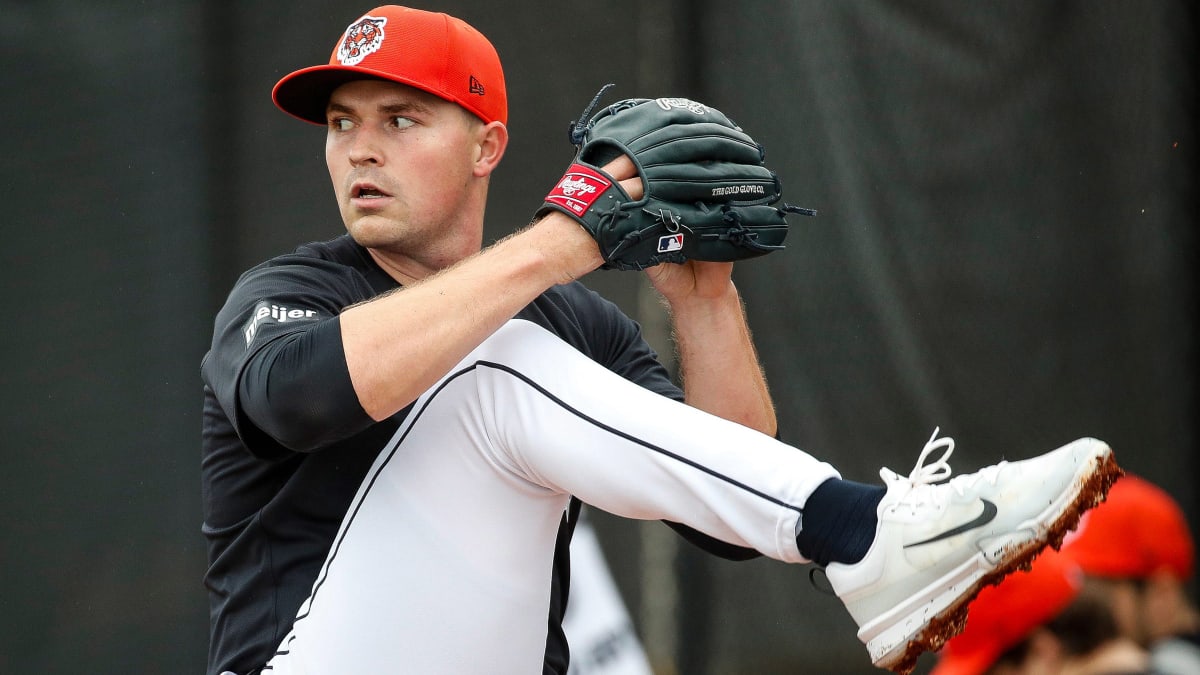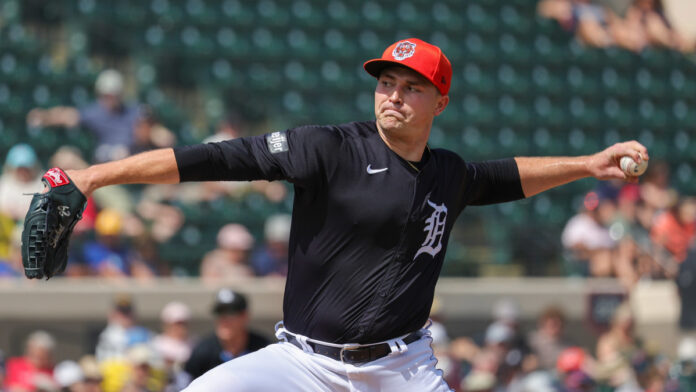Lakeland, Fla. – Go ahead. Admit it. You had no idea Tarik Skubal of the Detroit Tigers was the toughest starting pitcher to hit last year. He still is nowhere on your radar when it comes to potential breakout stars of 2024—maybe even Cy Young Award contenders.
Be forewarned. Overlook him at your own risk, which is pretty much what the baseball industry has done up to now.
Skubal is a 27-year-old lefthander from Kingman, Ariz., a small town in the northwest corner of the state better known for its turquoise lode and its kitschy status as the heart of Route 66 than as a baseball factory. As a high school senior throwing in the 80s, he received exactly one college scholarship offer, which he didn’t want to take. Three years later, MLB teams picked 254 players ahead of him before the Tigers finally took him in the ninth round. Six years later, including a second elbow surgery, Skubal still hasn’t thrown 150 innings in a pro season while averaging just 90 innings.
It is not your traditional résumé of a front-of-the-rotation starter, which happens to be one of the reasons why Detroit manager A.J. Hinch chose him as the team’s Opening Day starter.
“His compete button is off the charts,” Hinch says. “Every day it’s his turn to pitch, he brings the intensity and the purpose. He combines that with this desire to be elite—and a work ethic to match it.
“It’s just been fun watching him evolve. He doesn’t ever underestimate the competition. He’s got the good kind of chip on his shoulder. He made that clear to me, based on his path. And it’s for a good reason.
“Yeah, he’s not had an easy path. He had to earn his way to prospect status. Then he had to pitch his way to the big leagues. Then he’s had to grow here. And now he has a huge presence on this team.”
Says Skubal, “I was from a small town. There’s not a ton of exposure there. I went to a smaller [college]. So yeah, it’s not like I have a chip on my shoulder, but … right, I had to fight for everything.”
Mike Watters/USA TODAY Sports
The universe of lefthanded major league starting pitchers who can throw as hard as Skubal (95.8 mph on a four-seamer) with a plus changeup is incredibly small. Its population is three. The others are Shane McClanahan of the Tampa Bay Rays, who is recovering from elbow surgery, and Cole Ragans of the Kansas City Royals.
Moreover, Skubal hides the ball well with a high leg kick, a flash of a high glove hand and a serious shoulder tilt. He also pounds the strike zone (69% strikes last year) and is a true five-pitch guy who has many ways to defeat a hitter.
“He can pitch with different shapes in different parts of the zone and get swing and miss,” Hinch says. “The mix itself is kind of a common. Obviously, [two- and four-seam] fastball, slider, changeup and the curveball. But he can pitch to any bat strength. If he needs the ball driven down, he can drive the ball down with both fastballs and with all his pitches. If he needs the ball elevated with the four-seamer, he’s got that. If he needs slow spin, he’s got slow spin.
“Scoobie has the repertoire to attack any style hitter, even to change within a game.”
Skubal did not pitch last season until July 4, almost 11 months after he underwent flexor tendon surgery. His velocity jumped 1.7 mph, due, he says, to mechanical tweaks and to a vigorous post-surgery throwing program that included plyometric weighted balls. In 15 starts, Skubal was 7–3 with a 2.30 ERA, including a phenomenal September in which he was 4–0 with a 0.90 ERA with 43 strikeouts and four walks in 30 innings. The Tigers won all five times he took the ball that month. It was ace quality work.
“I think physically I just felt good every fifth day,” he says. “I was ready to go out there and compete every fifth day. There was not one day where I felt run down. That to me tells me that my routine was pretty good. And then obviously the work with the strength coaches in the training room was really, really good, too.
“I think that’s everything. You know, you feel good, and you can go out there and just play. You’re not worried about anything. It’s like your mind is just focused on one thing, and that’s executing pitch after pitch. So, when there’s nothing nagging or nothing kind of barking on you, it’s the best place to play, right?”
Like most pitchers today, even with plus velocity, Skubal deploys more non-fastballs than fastballs (52/48 mix). He has plus movement on only one pitch, his changeup, but his sequencing, command and deception are so good he gets above-average chase and below-average contact.
“I think our game planning to how we’re attacking guys is the key,” he says. “I like to keep things pretty simple. You can dive into numbers, and I will. There are days that I will. But I have four days to do that. And then my fifth day, I just go out and attack guys over the plate. Get them uncomfortable. Get them in my counts.
“First-pitch strikes are huge. It’s simple. You’ve been taught it since you were in Little League. It’s the same thing here. I think just going at guys and having that kind of mentality is huge.”

Junfu Han/USA TODAY NETWORK
His expected ERA last season was 2.30. Only Baltimore closer Felix Bautista had a better xERA (2.08). And measured by expected weighted on-base average, a metric which takes defense out of batted ball measurements, Skubal ranked No. 2 (.236) between two elite closers, Bautista at No. 1 (.224) and Josh Hader at No. 3 (.238). Short version: he is a nightmare to hit.
No such scouting report occurred when Skubal was a senior at Kingman Academy. He is the third of four sons of Laura and Russ Skubal, who named their boys Treyvor, Tyler, Tarik and Trent. What was it with all the names that start with T?
“That’s a good question for them,” Tarik says. “I don’t know. I didn’t ask. It’s kind of like they wanted to keep it simple. But I think they regret it because growing up if you got in trouble, they were never calling you by your right name. They would go down the list. It’s more frustrating for them. So, that’s something I will not do.”
During the fall of his senior season, trying to attract any college interest, Skubal commuted three hours to the Phoenix Valley to attend a showcase known as the Arizona Fall Classic. On his first day, a Wednesday, he touched 91 mph.
“That was the hardest I’d ever thrown in my life at that point,” he says. “I got a lot of interest, and then I was supposed to throw again on Saturday.”
In between, on Friday night, Skubal played in a football game—as the starting center. The next morning, he drove three hours back to the showcase to throw on two days “rest.” He was clocked at 84 mph. Just like that, the schools that were intrigued by 91 on Wednesday were out after 84 on Saturday.
“They’re like, ‘Yeah, no, never mind,’ ” he says. “So, there was interest and then there was none. And then Seattle [University] was the only school to kind of give me a card.
“And I didn’t even want to go there. I was like, ‘Dad, I’m not going to school there.’ And he’s like, ‘No, you need to call them, son.’ And I was like, ‘All right.’ I called them. I committed two weeks later. And the rest is history.
“I don’t really blame the other schools. I didn’t throw hard. I wasn’t a guy that was throwing in the 90s. But you know, it is interesting if you look at a lefthanded guy throwing 84 to 86 as a 16-year-old, you’d think that a scout or a college would project better. Whatever. It was a different time.”
Skubal pitched three seasons at Seattle, losing one year to Tommy John surgery after his sophomore year.
“Before the [junior] season started, I think there was legitimate talk of first to second round,” he says. “I was meeting with teams and they’re like, ‘Yeah, we have you at this pick. We’re going to take you here.’ And whether those guys make the decisions or not, I don’t know, but that’s what I was told.
“And then I just kind of struggled. I didn’t command the ball really well. Velocity was a tick down. Coming back from Tommy John, I hadn’t played in a year and a half.”
The Tigers finally took him in the ninth round.
“Draft day wasn’t enjoyable,” he says. “Yeah. You know, it wasn’t enjoyable but it’s okay. Once you’re picked, it doesn’t matter.”
It took a while, but the ascent of this hidden ace reached a new high on March 1. On that morning, Hinch gathered the Tigers in their clubhouse here.
“I kind of set it up as a story,” Hinch says.
He talked about how it was March and that the regular season would start later this month. He talked about how only a year ago at this time Skubal was playing catch on a backfield in recovery mode, and how he ended the season as the American League pitcher of the month. Skubal, he said, had earned the ball on Opening Day.
The room erupted in cheers and then, quickly, chants of “Speech! Speech!” It has become a team custom to demand a speech whenever a player is cited by the staff.
“The team loved it,” Hinch says. “And he was emotional.”
Says Skubal, “So, there I was, and I wasn’t ready for [a speech]. I just said, ‘I’m ready to go. I’m excited.’ You know, ‘Let’s go.’ And that was kind of it. So, that was all I could put into words in that moment. The heart was already racing. The voice was a little shaky. It was cool, though.”
On March 28, Skubal will step into the spotlight. He will take the ball in Chicago against the White Sox. He will be the Tigers’ youngest home-grown Opening Day starter since Justin Verlander 14 years ago and could become the youngest Tigers homegrown starter to win an opener since Brian Moehler a quarter of a century ago.
After one college offer, two elbow surgeries and eight draft rounds left unclaimed, Tarik Skubal is on the cusp of making a big name for himself.

